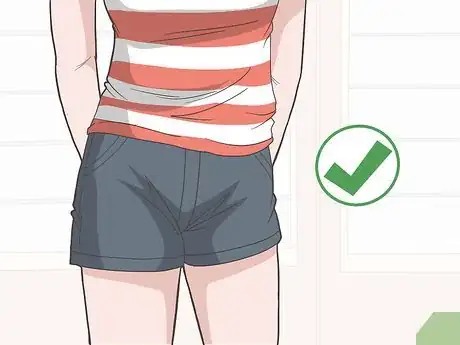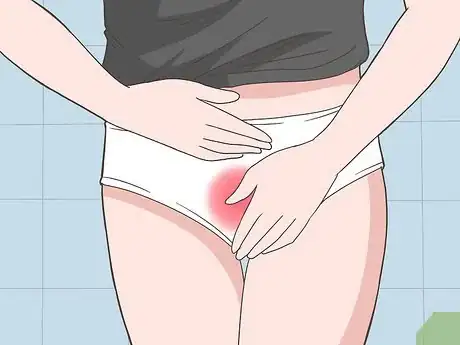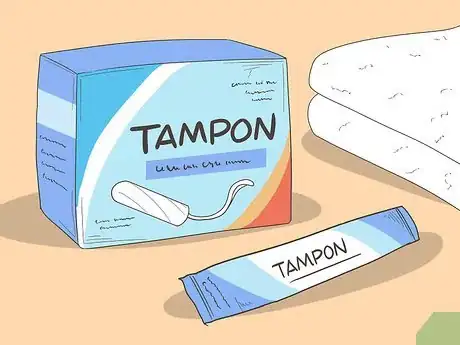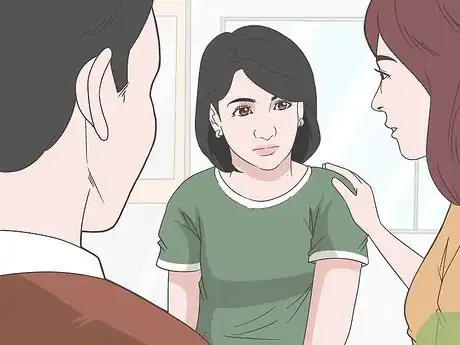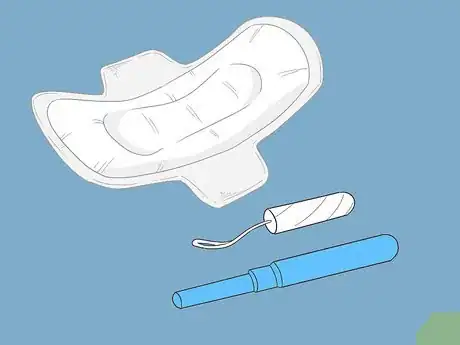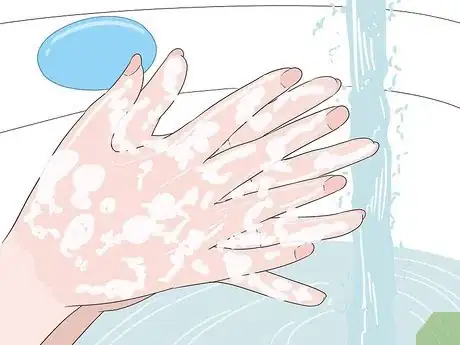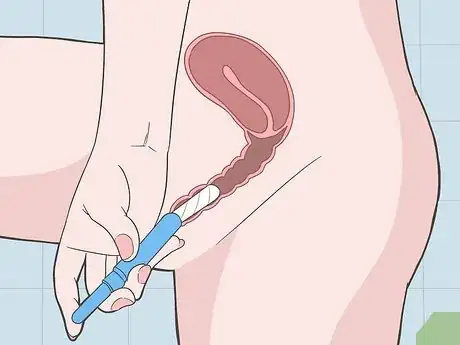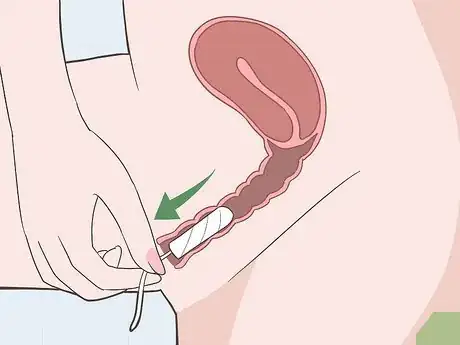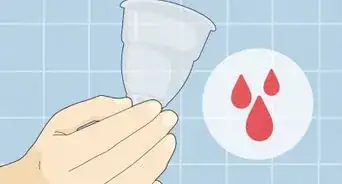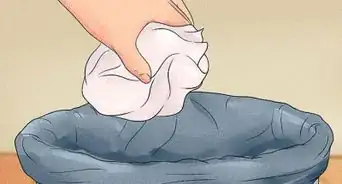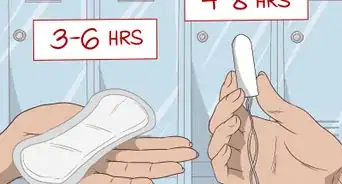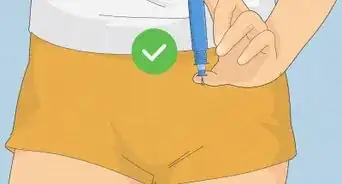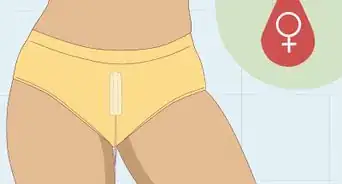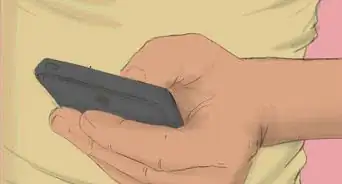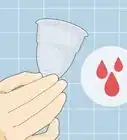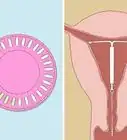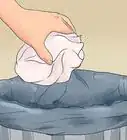This article was co-authored by Rebecca Levy-Gantt, MPT, DO. Dr. Rebecca Levy-Gantt is a board certified Obstetrician and Gynecologist running a private practice based in Napa, California. Dr. Levy-Gantt specializes in menopause, peri-menopause and hormonal management, including bio-Identical and compounded hormone treatments and alternative treatments. She is also a Nationally Certified Menopause Practitioner and is on the national listing of physicians who specialize in menopausal management. She received a Masters of Physical Therapy from Boston University and a Doctor of Osteopathic Medicine (DO) from the New York College of Osteopathic Medicine.
wikiHow marks an article as reader-approved once it receives enough positive feedback. This article received 12 testimonials and 90% of readers who voted found it helpful, earning it our reader-approved status.
This article has been viewed 545,797 times.
Deciding whether to use a tampon is a big decision and it's okay to feel a little overwhelmed. If you've just started menstruating, it's natural to have a lot of questions. Tampons are very safe when used correctly. You can begin using tampons as soon as you have your first period, but it's okay to be nervous about using a tampon for the first time. Learn a little about tampons to see if they're the right fit for you. Remember, there is no wrong choice when it comes to period protection. Make the choice that works for you.
Steps
Learning about Tampons
-
1Know you can use tampons as soon as you start menstruating. There is no age of girl that can't use tampons. As soon as you begin your period, you can start using tampons safely, if you are old enough to have your period, you are old enough to use tampons. There is no reason, physically, you need to wait to use a tampon. As long as you're comfortable, you can feel free to use tampons right away whatever your age. No one who gets their period is too young for tampons.[1]
-
2Use a tampon even if you're a virgin. Many people think tampons are unsafe to use if you're a virgin because they believe it can break the hymen and make them lose their virginity. This is a common myth. The hymen actually doesn't break during sex or any other activities, although it may stretch and tear. Even if you're a virgin, you can use a tampon without any problems.[2]
- Some women are actually born without a hymen altogether. You can stretch or tear your hymen through non-sexual activities without even noticing!
-
3Do not worry about pain. If your hesitance about tampons is related to pain, understand tampons should not normally be painful. Tampons are inserted past the vaginal muscle, and once they are past the muscle you shouldn’t feel any pain. You can’t push the tampon in too far—the cervix will stop it and you won’t be able to insert it past the cervix. They can't get lost inside you.
- It can help to start out using slim tampons.[3]
- If you do have pain or discomfort, the tampon may be not be pushed far enough in or could be inserted sideways.
Seeing if Tampons are Right for You
-
1Get more information about tampons. You can find information about tampons online from sites like Kids Health and the Planned Parenthood website, as well as online tutorials from sites like YouTube. You can also see if your school nurse or doctor's office provides any pamphlets or information regarding tampons or period protection in general.
- Reading up on the basics of tampons and how they work can help you decide if they're right for you, and every box of tampons contains information about them and how to insert one.
- You can also check out sites from popular tampon brands, like Kotex or Tampax.
- It may also help to look at diagrams of the female reproductive system. This can help you figure out where to insert a tampon if you choose to use one.
-
2Try using a tampon when you get your period to see if you like it.[4] If you're unsure if you'll be comfortable with tampons in the long run, try them out for a few days. Buy a small package of tampons or even ask a friend or family member to give you a few.
- If you find you dislike the way they feel, or if your uncomfortable using tampons, you can always go back to pads or a menstrual cup.
- Some companies, like Thinx, make “menstrual panties” that you can wear during your period with or without using a tampon or pad.
-
3Use tampons if you participate in high-intensity activities. Many women and girls prefer tampons because you can engage in more activities while wearing a tampon. If you're a swimmer, for example, you can wear a tampon in a pool, but you can't wear a pad. Activities that require a lot of movement, like dancing or playing sports, are also easier to do with a tampon.[5]
Seeking Advice from Others
-
1Talk to your friends. If you have any friends who use tampons, you can ask them for advice. Your friends can answer questions you have on how to insert a tampon and how tampons feel. This can help you decide whether or not you're personally ready to use tampons.
- Pick friends who are very supportive and non-judgmental. You don't want to talk to someone who would potentially give you a hard time about being unsure about tampons.
-
2Ask your parents for guidance. It might seem awkward to bring up the issue of menstruation with your parents. However, talking it out with your parents can be really helpful. Your mom especially will remember what it was like to begin her period and can help you work through your feelings.[6]
- It also helps to keep dialogue open with your parents regarding puberty. It's normal to have a lot of questions and your parents can help answer them.
-
3Seek out advice from older relatives. If you have older relatives, like an older cousin or aunt, they may be able to give you advice on tampons as well. This can be a great alternative if you want advice from someone a little older and more experienced. If your friends have not started their periods yet, it can also help to talk to seek advice from an adult.[7]
- If you don't have older female relatives, you can even talk to a friend's mother or a trusted female teacher or school nurse.
Using Tampons Safely
-
1Start with slender tampons. If you're using tampons for the first time, they may cause mild discomfort. While tampons are usually not painful, they do take getting used to. Start out with slender tampons until you're used to the way tampons feel.[8]
- It's a good idea to wear a pad in addition to a tampon at first, just to double up on protection.
- There are multiple absorbency levels to choose from depending on much you menstruate.[9]
-
2Wash your hands before inserting a tampon. Lather your hands with soap for about 20 seconds, making sure to wash under your fingernails and between your fingers. When you're done, rinse your hands thoroughly and dry them with a clean towel.[10]
-
3Insert the tampon carefully. With one hand, pull back the labia (the skin around the vaginal opening). Place the tip of the tampon in the vaginal opening. Aiming the tampon backwards, gently push the tampon into your vagina. When you feel your fingers touch your body, the tampon is fully inserted.[11]
- If you're using an applicator, use your fingers to push the inner tube through the applicator and remove the applicator with your thumb and index finger.
-
4
Expert Q&A
Did you know you can get expert answers for this article?
Unlock expert answers by supporting wikiHow
-
QuestionWhat absorbency should I choose when buying tampons?
 Rebecca Levy-Gantt, MPT, DODr. Rebecca Levy-Gantt is a board certified Obstetrician and Gynecologist running a private practice based in Napa, California. Dr. Levy-Gantt specializes in menopause, peri-menopause and hormonal management, including bio-Identical and compounded hormone treatments and alternative treatments. She is also a Nationally Certified Menopause Practitioner and is on the national listing of physicians who specialize in menopausal management. She received a Masters of Physical Therapy from Boston University and a Doctor of Osteopathic Medicine (DO) from the New York College of Osteopathic Medicine.
Rebecca Levy-Gantt, MPT, DODr. Rebecca Levy-Gantt is a board certified Obstetrician and Gynecologist running a private practice based in Napa, California. Dr. Levy-Gantt specializes in menopause, peri-menopause and hormonal management, including bio-Identical and compounded hormone treatments and alternative treatments. She is also a Nationally Certified Menopause Practitioner and is on the national listing of physicians who specialize in menopausal management. She received a Masters of Physical Therapy from Boston University and a Doctor of Osteopathic Medicine (DO) from the New York College of Osteopathic Medicine.
Board Certified Obstetrician & Gynecologist
References
- ↑ https://www.plannedparenthood.org/learn/health-and-wellness/menstruation/how-do-i-use-tampons-pads-and-menstrual-cups
- ↑ http://goaskalice.columbia.edu/answered-questions/virgin-eager-use-tampons-worried-about-hymen
- ↑ http://goaskalice.columbia.edu/answered-questions/virgin-eager-use-tampons-worried-about-hymen
- ↑ Rebecca Levy-Gantt, MPT, DO. Board Certified Obstetrician & Gynecologist. Expert Interview. 3 April 2020.
- ↑ https://www.plannedparenthood.org/learn/health-and-wellness/menstruation/how-do-i-use-tampons-pads-and-menstrual-cups
- ↑ http://kidshealth.org/en/kids/pads-tampons.html
- ↑ http://kidshealth.org/en/kids/pads-tampons.html
- ↑ http://goaskalice.columbia.edu/answered-questions/virgin-eager-use-tampons-worried-about-hymen
- ↑ Rebecca Levy-Gantt, MPT, DO. Board Certified Obstetrician & Gynecologist. Expert Interview. 3 April 2020.
- ↑ http://goaskalice.columbia.edu/answered-questions/virgin-eager-use-tampons-worried-about-hymen
- ↑ http://goaskalice.columbia.edu/answered-questions/virgin-eager-use-tampons-worried-about-hymen
- ↑ Rebecca Levy-Gantt, MPT, DO. Board Certified Obstetrician & Gynecologist. Expert Interview. 3 April 2020.
- ↑ http://youngwomenshealth.org/2012/09/27/tampons/

